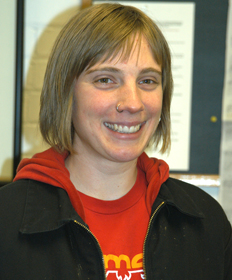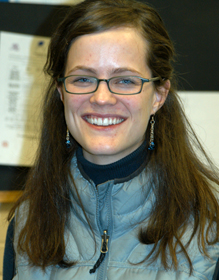Green living tips help low-income families save energy
Along with energy assistance, Spokane Neighborhood Action Program (SNAP) teaches basic energy conservation tips so low-income people learn how to save money on energy.
Its Living Green program emerged from realizing that helping people live more environmentally friendly lives in their homes will reduce their expenses as it reduces waste and use of toxic products.
 |
| Argyle Baukol |
Living Green specialists Argyle Baukol and Richelle Reid recently described their work.
“If people knew green living means spending less, more would be interested in it. It’s more than saving water, land and resources,” said Argyle, who began studying biology and botany at Eastern Washington University, where she earned a bachelor’s degree in liberal arts and photography in 2002.
After early years in Montana and then 10 years in Pullman, she moved to Spokane. She started with Living Green through AmeriCorps in 2005, and stayed when SNAP opened a full-time position.
Richelle, a 2005 graduate of Whitworth College in political studies and art, said she was always interested in environmental stewardship as an expression of faith. She grew up Catholic in Spokane and now attends Vintage Faith Community church.
In January 2004, she participated in a Whitworth Jan Term trip to South Africa to learn about the legacy of apartheid on the church, media, politics and environment. She saw environmental devastation in townships with no infrastructure to handle waste or garbage. She also saw innovative ways people were responding, such as a micro-enterprise project weaving purses and hats from plastic bags, and stores requiring customers to pay for plastic bags or bring their own bags.
Richelle began working with Living Green in October 2005. She had been active in environmental groups at Whitworth and helped start the sustainability club there. Studying urban planning and environmental issues stirred her interest in environmental policy.
She is heartened to see that in the last two years interest in environment has gained momentum and faith communities, especially in the evangelical Christian community. Many are now concerned about global warming and environmental stewardship.
Argyle said her “eco-consciousness” grew over years through reading. She wants to leave a “lighter footprint on the planet.” She grew up in a Presbyterian church and has drawn her values from different religions. In all faiths, she finds that compassion for humanity is essential to life.
“We are one organism on earth. We are all interconnected,” she said. “What enhances the environment enhances our lives, our neighbors’ lives and our whole community.”
For example, Argyle told of the correlation between American reliance on oil and the oil-based production of plastic products and chemicals now harming the environment. Dioxins are released in production, use and disposal of plastic products.
 |
| Richelle Reid |
SNAP started in the 1960s as a Catholic Charities organization. In the 1970s, the federal government mandated community action agencies, so it transitioned from Catholic Charities. Community action agencies provide services—food, clothing banks, energy assistance, weatherization and economic development—to low income people.
Living Green, as one part of SNAP’s Energy Conservation Program, focuses on individual decisions such as environmentally friendly shopping decisions.
“Single mothers struggle, so basic information is helpful,” Richelle said.
“As I teach people to live environmentally friendly lifestyles, I learn, too. There is an overwhelming amount of information on energy conservation, recycling resources, toxic waste, food issues and alternative energy.
“There is always something new to learn and incorporate in our lives through our buying habits and public policy,” said Richelle, who does advocacy outside her job through the Natural Resources Defense Council, Sierra Club and Priorities for a Healthy Washington. She is also on the Faith and Environment Network advisory board.
Living Green connects with the Faith and Environment Network to help churches learn about sustainable lifestyle choices and do energy and waste audits.
Richelle and Argyle teach classes at the SNAP Housing Improvements office at 212 W. Second. They talk with groups of five to 10 in homes or churches, and with gatherings of about 25 parents of children in ECEAP and HeadStart.
They lead energy conservation classes with Project Share to help people reduce electrical and heat energy use through weatherization and other simple actions. Participants receive a bag of energy-saving resources such as rope caulk, window plastic, a low-flow showerhead, an aerator for the faucet, compact fluorescent bulbs and electrical outlet gaskets.
“We also encourage people to start a garden, reduce driving, share car rides, recycle and reduce waste, and make their own nontoxic cleaning products,” Argyle said.
Popular nontoxic household cleaners include Castile soap, baking soda and vinegar, applied with scrub brushes, sponges and rags. Using more elbow grease means there will be fewer polluting chemicals in homes and rivers.
Natural landscaping and gardening are new topics for Living Green. Jim Blake, conservation education coordinator with Living Green, introduces drought-resistant native plants, alternatives to standard grass lawns, composting and organic gardens that use less water.
To support sustainable food systems, they encourage people to go to farmers’ markets and buy organic food grown locally.
“Often people don’t know what to recycle or where. I encourage them to separate mixed paper from trash and to buy bulk so they can reduce their garbage, use a smaller can and pay less.”
Most requests for classes come from people who have heard from those who have taken previous classes.
Argyle and Richelle are aware that there are many trade-offs and issues to balance. For example, does it save water to wash dishes by hand or in a dishwasher? Washing in a pot or bowl without running water saves, but some new dishwashers save over washing by hand.
“The trade-offs can be frustrating and overwhelming. Even though there are many aspects to consider, everyone can do something,” Argyle said.
Richelle encourages people to start with three little changes and then branch out: “I’m hopeful, especially when each person’s actions are added to hundreds and thousands of others,” she said.
Living Green outreach stretches beyond what Argyle and Richelle do, because they recruit and train volunteers to help with education. Volunteers are encouraged to attend two hours of training each month and to give two to 10 hours of education programs each month. Community education volunteers are often students. When people want to do more, they may volunteer to teach others.
“We can’t tell people what to think, but we can tell them the benefits and why it’s important. It’s daunting on the national scale with new coal plants and pressure to extract more resources,” said Argyle. “When someone in a Project Share class is frustrated about energy bills rising, I can encourage the person to write to his or her legislators, but I cannot tell them what to write.”
SNAP is supported by federal, state and private foundation funds. Living Green is supported by the Department of Energy, Energy Assistance, the State Department of Ecology, private foundations and individual donors.
Argyle is hopeful that by sharing knowledge everyone can do something and make better choices, and when all act in solidarity with their neighbors, the state and nation, it will have major impact.
For information, call 744-3370 ext. 205 or see livinggreensnap.org.
Mary Stamp - The Fig Tree - © May 2007




